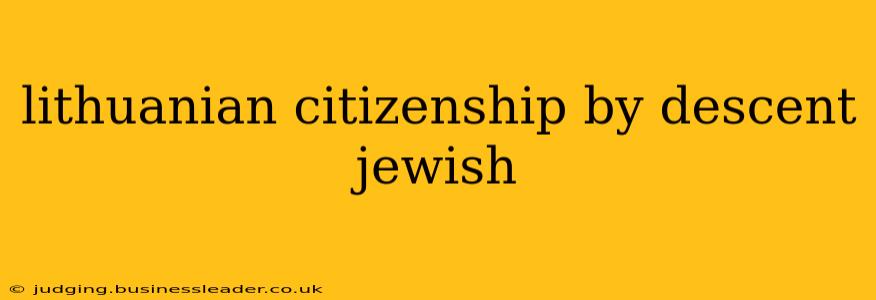Obtaining Lithuanian citizenship by descent can be a complex process, particularly for those of Jewish heritage tracing their roots back to pre-war Lithuania. This guide aims to clarify the process, addressing common questions and concerns for Jewish individuals seeking Lithuanian citizenship.
What is the process for Lithuanian citizenship by descent?
Lithuanian citizenship by descent is granted to individuals who can prove uninterrupted lineage to a Lithuanian citizen who lost their citizenship due to Soviet occupation or other historical events. This means establishing a direct line of descent from a pre-1940 Lithuanian citizen, proving their citizenship, and demonstrating that the lineage has remained unbroken. The complexity arises from the often fragmented and incomplete records from this period. Many Lithuanian Jews lost their citizenship and documentation during the Holocaust and subsequent Soviet rule. Reconstructing this lineage often requires extensive genealogical research and meticulous documentation.
What documents are typically required for Lithuanian citizenship by descent?
The required documents can vary depending on the specific circumstances and the Lithuanian consulate's requirements. Generally, you will need to provide:
- Birth certificates: These must cover the entire lineage, tracing back to the Lithuanian citizen. Certificates should be issued by the relevant authorities at the time of birth and often require translation and legalization/apostille.
- Marriage certificates: These are crucial for establishing the connection between generations in the family line. Similar to birth certificates, they often need translation and legalization.
- Death certificates: Documentation of the death of individuals in the lineage helps establish the chain of succession.
- Proof of Lithuanian citizenship of the ancestor: This is often the most challenging part. It may require examining historical records, census data, and other archival materials. A Lithuanian passport or other official documentation from the pre-war period would be ideal, but such documentation is often unavailable.
Can I apply for Lithuanian citizenship by descent if my ancestors were Lithuanian Jews?
Yes, absolutely. The process is the same regardless of religious affiliation. However, the difficulties in obtaining the necessary documentation might be amplified due to the loss of life and records during the Holocaust. Many Jewish families lost their records during this period, making the process of proving lineage more challenging.
What are the challenges of proving lineage for Lithuanian Jews seeking citizenship?
As mentioned, the major challenge lies in the destruction of records and the disruption of family lines during the Holocaust and Soviet era. Many records were destroyed or lost, making it difficult to trace the uninterrupted lineage required for citizenship. Furthermore, the names and spelling of names might have changed over time, adding another layer of complexity to the research.
How can I find the necessary documentation to prove my lineage?
This often requires professional genealogical research. Specialized researchers familiar with Lithuanian archives and historical records can greatly assist in this process. They can help to locate and interpret vital records, providing you with the necessary documentation to support your application. Additionally, contacting relevant archives in Lithuania and other countries where your ancestors may have lived might be necessary.
What if I cannot find all the necessary documents?
This is a common issue. If you can't find all necessary documentation, it's crucial to present the strongest possible case with the documents you possess. The Lithuanian consulate will consider all evidence presented. It’s wise to consult with a lawyer specializing in Lithuanian citizenship applications to assess your chances of success.
How long does the Lithuanian citizenship by descent process usually take?
The processing time for Lithuanian citizenship applications can vary considerably, often taking several months or even years. The time taken depends on the complexity of the case, the availability of documentation, and the workload of the Lithuanian authorities.
This information is for guidance only and does not constitute legal advice. It's essential to consult with professionals specializing in Lithuanian citizenship law for personalized advice and assistance. The process requires patience, meticulous research, and possibly professional assistance to successfully navigate its complexities.
